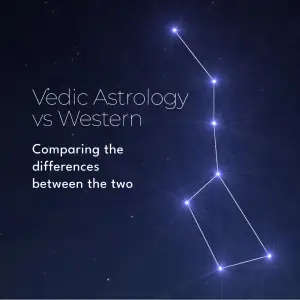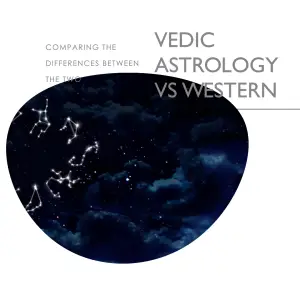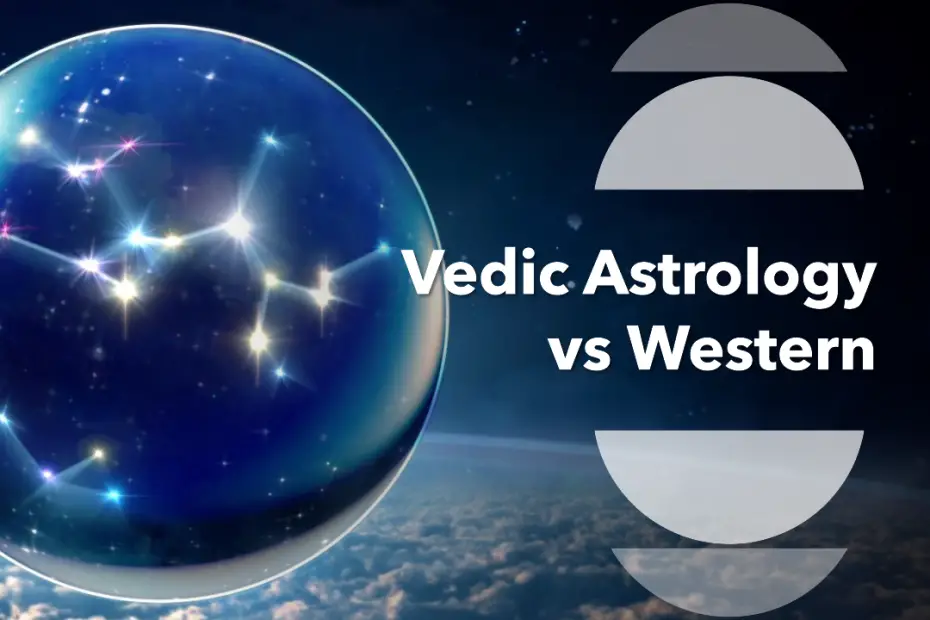Are you stuck between choosing your cosmic guide? Vedic Astrology vs Western: which one suits you best?
Whether you’re an adventurous Aries or a pragmatic Capricorn, let’s unravel the stars and uncover the celestial truths. Curious? Let’s dive in!
Ancient Wisdom: Vedic vs. Western

The timeless quest for understanding the cosmos has led to the emergence of various astrological traditions, among which Vedic and Western astrology stand prominent.
Vedic astrology, an ancient Indian system, and Western astrology, with its roots in Greco-Roman civilization, both offer profound insights into human existence, destiny, and celestial influences.
Discover Your FREE Personalized Moon Reading NowCelestial Insights: Contrasting Paths
In the pursuit of interpreting celestial events and their impact on human lives, Vedic and Western astrology embark on distinct paths.
Vedic astrology relies on the concept of interconnectedness and karma, viewing planetary movements as divine orchestrations shaping our destinies.
In contrast, Western astrology emphasizes psychological aspects, exploring the human psyche and behavioral patterns in relation to planetary alignments.
Zodiac Systems: East and West
A fundamental divergence lies in the zodiac systems employed by these astrological traditions. Vedic astrology employs the Sidereal Zodiac, which considers the actual positions of constellations.
Western astrology, on the other hand, utilizes the Tropical Zodiac, which is based on the position of the Sun relative to the Earth’s seasons.
Discover Your FREE Personalized Moon Reading NowThis difference results in a variance of approximately 23 degrees between the two systems.
Cosmic Perspectives: Vedic Astrology

Vedic astrology perceives the cosmos as a magnificent web of interconnected forces, where karma, fate, and spiritual evolution intertwine.
It delves deep into an individual’s past, present, and future, offering profound insights into the soul’s journey.
Vedic astrologers meticulously analyze the positions of the planets at the time of birth to unravel the karmic tapestry that shapes one’s life.
Discover Your FREE Personalized Moon Reading NowPlanetary Alignment: Western Approach
Conversely, Western astrology takes a more human-centric approach, focusing on psychological aspects and individual traits.
The emphasis lies on the alignment of the Sun, Moon, and planets at the time of birth, determining the twelve zodiac signs that represent distinct personality traits.
Western astrologers believe that the position of celestial bodies at birth influences one’s character and life path.
Fate or Free Will? Vedic Debate
A fundamental philosophical debate emerges when discussing Vedic astrology – the interplay between fate and free will.
While some argue that karma and destiny determine our life’s trajectory, others believe in the power of free will to shape our actions and reactions.
Discover Your FREE Personalized Moon Reading NowVedic astrology acknowledges both, suggesting that our present actions can alter our future karma.
Related Article: What Is The Moon In Today Astrology
Astrological Houses: East vs. West
Vedic and Western astrology both employ astrological houses to understand various aspects of life, but they differ in their approach.
Vedic astrology uses a Whole Sign House system, where each sign occupies an entire house, simplifying the interpretation process.
On the contrary, Western astrology relies on the Placidus House system, which considers the varying sizes of houses based on the individual’s location and time of birth.
Discover Your FREE Personalized Moon Reading NowPredictive Techniques: Contrasting Methods
The techniques employed for predictions in Vedic and Western astrology highlight their contrasting methodologies.
Vedic astrology places immense significance on the concept of dashas (planetary periods), providing a timeline of events in one’s life.
Western astrology, however, relies on transits, where the current positions of celestial bodies are analyzed to make predictions.
Moon Sign Mystique: Vedic Insights
In Vedic astrology, the Moon holds a special place as a key determinant of the mind and emotions.
The Moon sign, known as Rashi, plays a vital role in understanding an individual’s emotional responses and instincts.
Discover Your FREE Personalized Moon Reading NowThis emphasis on the Moon allows for a deeper understanding of emotional complexities and subconscious drives.
Sun Signs Unveiled: Western Traditions
Western astrology, in contrast, places the Sun sign at the center of its system.
The Sun sign represents the core identity and ego of an individual, providing insights into their fundamental traits and characteristics.
The Western approach is particularly popular in mainstream horoscope columns and pop culture, contributing to its widespread recognition.
Remedial Measures: Vedic Solutions
When it comes to remedies for challenges and obstacles, Vedic astrology offers a myriad of solutions. From mantras and gemstone recommendations to charitable acts,
Discover Your FREE Personalized Moon Reading NowVedic astrologers provide a holistic approach to mitigate adverse planetary influences and promote positive outcomes.
These remedial measures are deeply rooted in ancient traditions and spiritual practices.
Birth Chart Basics: East and West
A significant point of convergence between Vedic and Western astrology lies in the birth chart, which serves as the foundational tool for astrological interpretations.
Both systems utilize a circular chart divided into twelve sections, each representing different facets of life. The birth chart is a celestial map, guiding astrologers in their analysis and predictions.
Related Article: Where Did Astrology Come From
Timeless Divination: Vedic Wisdom
Vedic astrology stands as a reservoir of timeless wisdom, carrying the knowledge and insights passed down through generations.
It encompasses a vast array of astrological texts, including the Vedas and Puranas, enriching its interpretations with profound philosophical and spiritual principles.
Astrology in Modern Times: A Clash
In contemporary society, Vedic and Western astrology often find themselves in a clash of ideologies.
While Western astrology dominates the Western world and popular culture, Vedic astrology continues to hold strong roots in the Indian subcontinent.
The debate over which system holds superior accuracy and relevance remains a subject of ongoing discussion.
Discover Your FREE Personalized Moon Reading NowCultural Influences: Vedic vs. Western
Cultural influences have significantly shaped the development and acceptance of these two astrological traditions.
Vedic astrology is deeply interwoven with Hindu culture, philosophy, and spirituality, while Western astrology draws from Greco-Roman mythology and philosophical principles.
These cultural foundations have contributed to their distinct methodologies and perspectives.
FAQs About Vedic Astrology vs Western
Is Vedic or Western astrology more accurate?
Vedic and Western astrology are both systems used to interpret celestial influences on human life. The accuracy of astrology depends on individual beliefs and experiences.
Some may find Vedic astrology more accurate due to its complex calculations based on precise astronomical data.
Discover Your FREE Personalized Moon Reading NowHow does Vedic astrology differ from Western astrology?
Vedic astrology, also known as Jyotish, originates from ancient Indian texts and employs a sidereal zodiac, considering the fixed stars’ positions.
Western astrology, on the other hand, uses a tropical zodiac linked to the equinoxes. The two systems also differ in the techniques used to analyze charts and interpret planetary influences.
Is Vedic astrology accurate?
The accuracy of Vedic astrology is a subject of debate among practitioners and skeptics.
Many individuals believe in its efficacy due to its historical significance and the intricate methods used for calculations.
However, like any astrological system, its accuracy may vary from person to person.
Discover Your FREE Personalized Moon Reading NowWhat is my zodiac sign according to Vedic astrology?
To determine your Vedic zodiac sign, you need your birth chart, which considers the position of the Moon at the time of your birth.
The Vedic zodiac has 12 signs, just like Western astrology, but the dates may differ due to the variations in the two systems.
Which astrology is more accurate in the world?
The accuracy of astrology is subjective and can vary from one person to another. Both Vedic and Western astrology have their followers who believe in their accuracy.
Ultimately, it depends on individual perspectives and experiences.
Why is my Vedic astrology different?
If you find differences between your Vedic and Western astrology readings, it’s likely due to the varying methods and calculations used in the two systems.
Discover Your FREE Personalized Moon Reading NowVedic astrology places great emphasis on the Moon’s position and specific planetary alignments, which can result in divergent interpretations.
How is Vedic astrology different from regular astrology?
The term “regular astrology” isn’t specific, but assuming it refers to Western astrology, the primary difference lies in their zodiac systems and calculation methods.
Vedic astrology employs a sidereal zodiac, while Western astrology uses a tropical zodiac. This leads to variations in chart placements and interpretations.
Why is Vedic and Western astrology so different?
The differences between Vedic and Western astrology can be attributed to their distinct historical origins and cultural contexts.
Vedic astrology evolved in ancient India, while Western astrology developed in ancient Greece and Rome. The varying philosophical foundations and observational approaches led to their dissimilarity.
Discover Your FREE Personalized Moon Reading NowIs Vedic astrology better?
The idea of whether Vedic astrology is “better” is subjective and depends on individual beliefs and preferences.
Vedic astrology offers a rich system with specific techniques and deep-rooted traditions, making it appealing to some individuals. However, others may find Western astrology more suitable for their needs.
Why are Indian zodiac signs different?
Indian zodiac signs, which are a part of Vedic astrology, differ from those used in Western astrology due to the contrasting zodiac systems they follow.
Vedic astrology uses the sidereal zodiac, which considers the fixed stars’ positions, while Western astrology employs the tropical zodiac, linked to the seasons.
Is sidereal and Vedic the same?
The terms “sidereal” and “Vedic” are related but not the same. Sidereal refers to the zodiac system based on the fixed stars’ positions, and Vedic astrology uses this sidereal zodiac.
Discover Your FREE Personalized Moon Reading NowSo, when referring to Vedic astrology, it often means sidereal astrology, but not all sidereal astrologers practice Vedic methods.
Final Thoughts About Vedic Astrology vs Western
Vedic astrology and Western astrology, while both aiming to interpret celestial influences on human life, differ significantly in their approaches.
Vedic astrology, rooted in ancient Indian texts, uses a sidereal zodiac, focusing on fixed stars’ positions and intricate calculations. In contrast, Western astrology relies on a tropical zodiac linked to equinoxes.
The accuracy and preference for one system over the other vary among individuals.
Some find Vedic astrology’s depth and traditional significance compelling, while others resonate more with Western astrology’s psychological approach.
Discover Your FREE Personalized Moon Reading NowUltimately, both systems offer unique insights into astrology, making it a matter of personal choice and belief.
